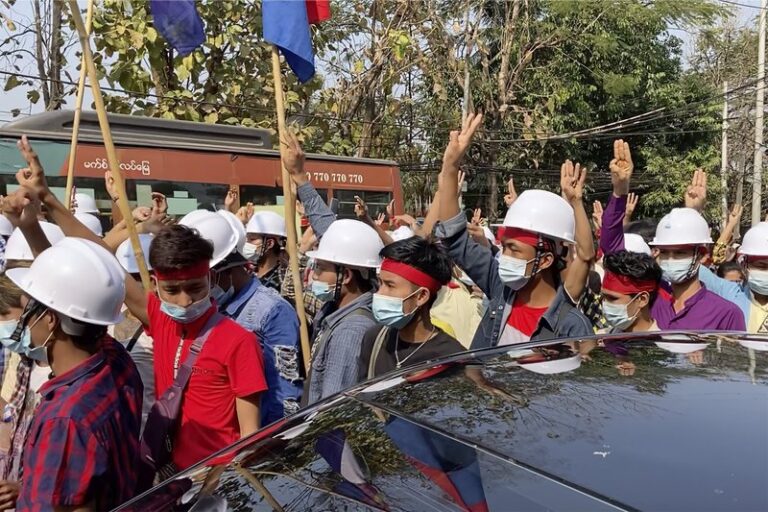
(AP) — Myanmar’s new military authorities appeared to have cut most access to the internet on Saturday as they faced a rising tide of protest over their coup that toppled Aung San Suu Kyi’s elected government.
Numerous internet users noted a slow disappearance of data services, especially from mobile service providers, that accelerated sharply late Saturday morning. Broadband connection also later failed, while there were mixed reports on whether landline telephone service and mobile voice connections were still working.
Netblocks, a London-based service that tracks internet disruptions, said Saturday afternoon that “a near-total internet shutdown is now in effect” in Myanmar, with connectivity falling to just 16% of normal levels.
The broad outage followed Friday’s military order to block Twitter and Instagram because some people were trying to use the platforms to spread what authorities deemed fake news. Facebook had already been blocked earlier in the week — though not completely effectively.
The communication blackout is a stark reminder of the progress Myanmar is in danger of losing after Monday’s coup plunged the nation back under direct military rule after a nearly decade-long move toward greater openness and democracy. During Myanmar’s previous five decades of military rule, the country was internationally isolated and communication with the outside world strictly controlled.
Suu Kyi’s five years as leader since 2015 had been Myanmar’s most democratic period despite the military retaining broad powers over the government, the continued use of repressive colonial-era laws and the persecution of minority Rohingya Muslims.
The blockages are also adding greater urgency to efforts to resist the coup. In one of the largest protests so far, about 1,000 people — factory workers and students prominent among them — marched down a main street in Yangon, the country’s biggest city, and were met by more than 100 police in riot gear.
They shouted “down with dictatorship” and other slogans, marched with their hands in the air and flashed three-fingered salutes, a symbol of defiance adopted from protesters in neighboring Thailand. There was no violence reported.
Similar-sized demonstrations took place in at least two other areas of the city. At Yangon’s City Hall, protesters presented flowers to police, some of whom carried assault rifles.
Other reports that slipped through the communications blockade said protests were held in other cities, including Mandalay, the second largest.
Telenor Myanmar, a major mobile operator, confirmed it had received Friday’s order to block Twitter and Instagram. In a statement, Twitter said it was “deeply concerned” about the order and vowed to “advocate to end destructive government-led shutdowns.”
“It undermines the public conversation and the rights of people to make their voices heard,” its spokesperson said.
Since the coup, social media platforms have been major sources of independent news as well as organizing tools for protests.
Amnesty International called the shutdown “a heinous and reckless decision” at a time when Myanmar was coping with the coup, years of civil conflict and the COVID-19 crisis.
Those opposed to the coup and the arrests of activists and politicians have also been gathering at night at windows and on balconies around Yangon, banging on pots and pans.
On Friday, nearly 300 elected lawmakers from Suu Kyi’s National League for Democracy party who met in an online meeting declared themselves as the sole legitimate representatives of the people and asked for international recognition as the country’s government.
They were supposed to have taken their seats Monday in a new session of Parliament following November elections when the military announced it was taking power for a year.
The military accused Suu Kyi and her party of failing to act on its complaints that last November’s election was marred by fraud, though the election commission said it had no found no evidence to support the claims.
Suu Kyi and President Win Myint are also under house arrest and have been charged with minor offenses, seen by many as merely providing a legal veneer for their detention.
In addition to the 134 officials and lawmakers who were detained in the coup, some 18 independent activists were also held, said the Assistance Association for Political Prisoners in Myanmar. Some have been since released.





